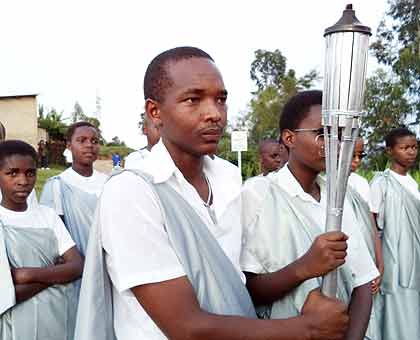Telling the truth about what happened during the Genocide against the Tutsi will help heal wounds and build lasting unity among the Rwandan people.


Telling the truth about what happened during the Genocide against the Tutsi will help heal wounds and build lasting unity among the Rwandan people.
This was the message delivered as Nyarugure residents converged at Kibeho to welcome the Kwibuka (Remembrance) Flame as it reached Kibeho Sector, Nyaruguru District.
The arrival of the torch in the district marked its 8th stop on its national tour which will see it traverse all the 30 districts ahead of the national commemoration week which starts on April 7.
It arrived in Nyaruguru from Gisagara District, where it had been since Monday.
The Kwibuka Flame symbolises remembrance as well as the resilience and courage of Rwandans over the past twenty years.
Speaking at the event, the Minister for Public Service and Labour, Anastase Murekezi, told the hundreds of residents who turned up for the occasion that the Flame "reflects where Rwanda has come from, and what we have achieved to-date”.
"This Flame reminds us that we have gone a long way and that we have successfully emerged from the darkness of Genocide to a prosperous nation,” Murekezi said.
However, he said, a lot remains to be done to ensure that the country achieves sustainable development.
He said 20 years after the Genocide that claimed more than a million innocent lives, the time has come to reflect on the nation’s past and the circumstances under which it descended into ‘hell’ so as to reaffirm the notion of never again.
"We should always seek to comprehend why a part of the Rwandan population killed their compatriots; the same people they lived with and shared everything including culture and language,” Murekezi said.
He said the country’s history left many broken hearts due to tragic experiences, noting that for the country to continue its reconstruction and development path, it was imperative that people speak ‘frankly, openly and candidly’ about the nation’s history.
"The solution to healing the broken hearts lies in open and frank discussion,” he said. "Truth is all we need. For those who played a role in the Genocide, they should own up, repent and seek forgiveness.”
Nyaruguru mayor Francois Habitegeko said the district experienced some of the worst massacres in 1994. Kibeho memorial site is home to over 28 000 Genocide victims.
He promised continued support to vulnerable survivors, in form of domestic animals and housing.
Moving testimonies
During the 1994 Genocide against the Tutsi, Kibeho was the scene of the mass murder of students from Marie Merci School.
Thousands of Tutsis were also killed at a local church where they had taken refuge.
Angelique Uwase, a survivor, gave a moving testimony of how countless of Interahamwe and Gendarmes attacked the Kibeho church in the days following the outbreak of the massive killings in April 1994.
They sprayed bullets and hurled grenades into the crowd, killing many of them, Uwase testified.
She was among the few luckiest who survived the killings in Kibeho. Twenty years down the road, she says she has managed to uplift herself.
"The future looks even brighter,” she said as she concluded her testimony.
Another person who testified at the event is a Genocide convict who was among the killers at Kibeho Church.
Athanase Nsabimana, a former Police Officer, narrated how together with Interahamwe militia they attacked the Kibeho Church, killing hundreds of Tutsis.
"Bad leadership is the reason Genocide happened,” Nsabimana said.
He said he feels guilty and ashamed of his role in the Genocide.
"Instead of using the gun I had to protect people and save lives, I used it to kill the defenceless,” he said. "I became a villain.”
Nsabimana, who pleaded guilty to genocide charges and sought forgiveness, was sentenced to 20 years in jail. In 2007, he was released from jail and completed his remaining three-and-a-half years doing community work.
Today, Nsabimana is a member of an association which brings together both survivors and perpetrators geared to champion unity and reconciliation while improving their livelihoods.
"I encourage anyone who played a role in the Genocide to come out and seek forgiveness. That way, we will work together to build our country,” Nsabimana said.


